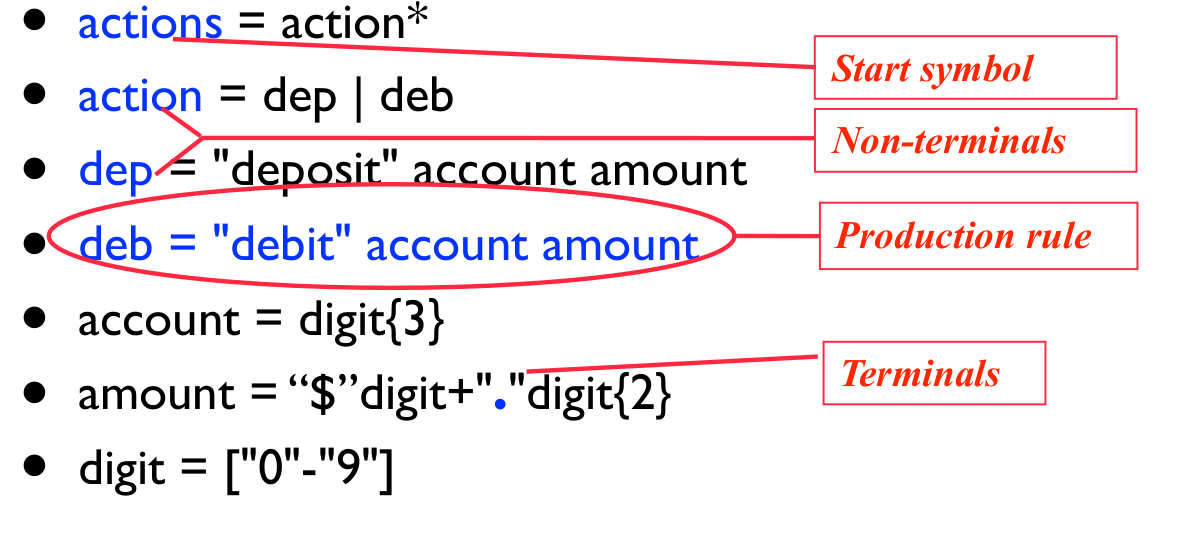Syntax-based Testing
Mutation Testing
Input-space grammars - to create inputs (both valid and invalid)
Program-based grammars - to modify programs (valid)
Using Grammar
- Two ways to use input grammars for software testing and maintenance
Recognizer - can include them in a program to validate inputs
Generator - can create program inputs for testing
Terminology
Ground String - A (valid) string belonging to the language of the grammar
Mutation Operator - A rule that specifies syntactic variations of strings generated from a grammar
Mutant - The result of one application of a mutation operator to a ground string
- May be generated either by modifying existing strings or by changing a string while it is being generated
Coverage Criteria
Terminal Symbol Coverage (TSC) - TR contains each terminal of grammar G
Production Coverage (PDC) - TR contains each production of grammar G
Derivation Coverage (DC) - TR contains every possible string derivable from G
- PDF subsumes TSC
- DC often generates infinite test sets
- Will have huge numbers of inputs even if you limit to fixed-length strings
Testing Invalid Inputs
Reasons
- Often implementers overlook invalid inputs
- Undefined behaviour not accetpable
Solution
- Mutate grammars and generate test strings from the mutated grammars
Grammar Mutation Operators
Nonterminal Replacement
dep = "deposit" account amount => dep = "deposit" amount amount
e.g. deposit 123 $12.35 => deposit $9.22 $12.35
Terminal Replacement
amount="$"digit+"."digit{2} => amount="$"digit+"$"digit{2}
Terminal and Nonterminal Deletion
dep="deposit" account amount => dep="deposit" amount
Terminal and Nonterminal Duplication
dep="deposit" account amount => dep="deposit account account amount"
Killing Mutants
- Test case t kills m if running t on m produces different output than running t on
- Where m is a mutant for an original ground string program
Coverage Criteria
Mutation Coverage (MC) - For each mutant m, TR contains a requirement to "kill m"
- Mutation score is the percentage of mutants killed
Mutation Operator Coverage (MOC) - For each mutation operator op, TR contains requirement to create a mutated string m derived using op
Mutation Production Coverage (MPC) - For each mutation operator op and each production p that op can be applied to. TR contains requirement to create a mutated string from p
Mutant Testing (Program-based Grammars)
- Generating mutants by modifying programs according to the language grammar, using mutation operators
- Mutants are valid programs (not tests) which ought to behave differently from the ground string
The goal of mutation testing create tests which distinguish mutants from originals
Once we find a test case that kills a mutant, we can forget the mutant and keep the test case. The mutant is then dead
Uninteresting Mutants
- Stillborn - such mutants cannot compile (or immediately crash)
- Trivial - killed by almost any test case
- Equivalent - indistinguishable from original program
Goals of Mutation Testing
- Mimic (and test for) typical mistakes
- Encode knowledge about specific kinds of effective test in practice
Strong and Weak Mutation
Strong mutation - a fault must be reachable, infect the state, and propagate to output Weak mutation - a fault which kills a mutant ned only be reachable and infect the state
Mutation Coverage
Strongly Killing Mutants - given a mutant m for a program P and a test t, t is said to kill m iff the output of t on P is different from the output of t on m
Strong Mutation Coverage (SMC) - for each mutant , TR contains a test which strongly kills m
Weakly Killing Mutants - given a mutant m that modifies a source location L in a program P and a test t, t is said to weakly kill m iff the state of the execution of P on t is different from the state of the execution of m on t, immediately after some execution of L
Weak Mutation Coverage (WMC) - for each mutant , TR contains a test which weakly kills m
